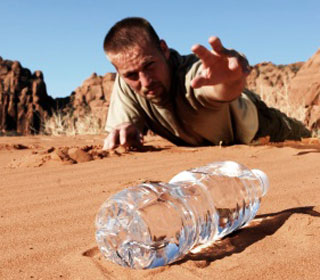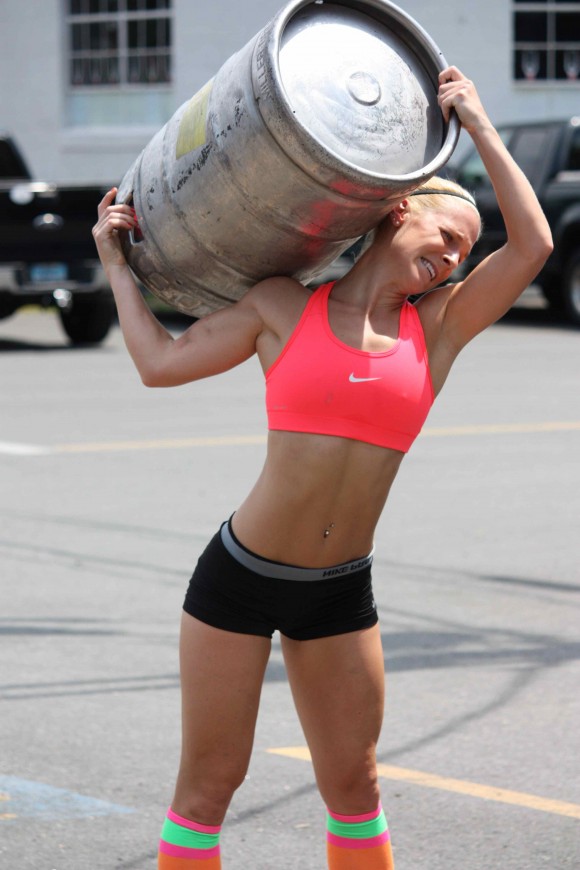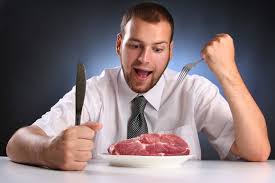I have a “touch of OCD.”
No, I don’t check whether the stove is off every 10 minutes or organize my sock drawer like Iron Chef Morimoto arranging an ornate plate of sushi.
It’s just when I take an interest in something, I really take an interest — often at the expense of things like work, sleep, and laundry. Which I’ll have you know has piled up to Mt. Kilimanjaro proportions.
While I had grand plans for this blog to be about exercise and nutrition tips from the pros that actually work, this past week fitness writing has been on my radar. Because, for the most part, it sucks like Hoover.
That’s not news. Anyone familiar with fitness media understands that 90% of what you read and hear could double as lawn fertilizer.
I shouldn’t talk. I’ve written some stuff that was dubious at best. I once (under a pseudonym) wrote a 2000-word stool pigeon about how calories don’t count.
Hey, I needed the dough, and the editor was happy. Besides, the kid in me thinks that sometimes it’s fun to write a big ball of stupid and sit back and watch the world burn.

Yet it’s one thing to write a bad article or “mail one in” to appease an editor or meet a pressing deadline. It’s another to deliberately write something untrue just to get more web traffic.
And it’s a whole other level of scumbag to then misrepresent scientific studies to “back up” your nonsense.
Too Much Protein?!
Recently an article published in a mainstream magazine titled “3 Signs You Could Be Eating Too Much Protein” found its way onto my Facebook feed.
The headline caught my attention — and as you’ll see, that’s usually not a good thing. Still, I was curious what irreparable damage I was supposedly doing to myself by eating my bodyweight in chicken, turkey, and eggs every week.
And the warning signs you could be eating too much protein? You’re gaining weight, you have kidney damage, and you’re dehydrated.
Those are the signs to watch for?
I was both amused and disturbed, and so were a couple of PhD’s I know.
So let’s look at these three “signs” that you’re eating too much protein and see why they’re completely off-base.
Then I’ll get to the bigger, scarier picture.
#1. You’re gaining weight.
I don’t know about you, but if my pants start fitting tight I don’t immediately blame the roasted chicken on my plate.
“If you’re gaining weight, you’re taking in too many calories,” says surgeon and researcher Dr. Bryan Chung of evidencebasedfitness.net.
“This could include protein, sure, but weight gain isn’t a sign of too much protein — it’s a sign of too much positive energy balance, of which protein could be one of the sources.”
Fellow PhD Brad Schoenfeld agrees, adding that protein should be among the last things you blame for weight gain.
“Protein consumption induces satiety, so consumption of additional protein would generally help lower overall caloric intake due to increased satiety, and the higher TEF (thermic effect of food) would result in less energy stored,” says Schoenfeld.
“Moreover, the recent paper by Dr. Jose Antonio of the ISSN shows just how difficult it is to overeat protein.”
#2. You have kidney damage.
While people with existing kidney conditions are advised to go on a protein-reduced diet, it certainly doesn’t mean a high protein intake causes kidney issues.
That’s not even the half of it.
“Kidney damage a sign? How the hell does someone know they have kidney damage?” asks Chung. “And how do I know that said kidney damage isn’t a sign of say, an autoimmune disorder?”

#3. You’re dehydrated.
This was the real WTF for me. Call me crazy but if I were dehydrated, I’d take that as a sign to drink more fluids, not cut back on the number of eggs in my omelet.
Dr. Chung agrees. “There are so many other causes for dehydration that using this as a ‘sign’ that you’re eating too much protein is laughable.”
So now the more educated fitness types have a good belly laugh and go on their merry way. There’s more to it though.
For one, hatchet jobs like this aren’t just bad — they’re counterproductive. Mainstream magazines have enormous reach, and in this case, the average person reading would likely benefit from increasing his or her protein intake – for the satiety factor — not decreasing it.
So if anything, this bullshit article should help its typical reader gain weight, not lose it.
Second, and even more worrisome, is the use of sloppy arguments and bad science to support what’s really just an attention grabbing headline.
Having been at this for a while, it’s almost like the editors are first determining what headlines will generate the most traffic, and then create (i.e., pull from their rectum) the coinciding article — along with whatever science they can find, however spurious, to back it up. Even twisting the science to support the outlandish headline.
“Its shameful,” says Schoenfeld. “Its bad science any way you slice it.”
And this smoke show is happening all over the internet.

Bait & Click
I call it Bait & Click — using over the top headlines to rise above the media noise and get readers attention.
It’s like a 4 year-old in Walmart shrieking that much louder than his siblings to get his harried mother’s attention. The reward for the virtual tantrum is the currency in electronic media, the click.
The click is a chance to get as many eyeballs as possible on your site — even if it’s just to skim yet another generic fitness article of little value — and expose them to your advertisers or your ever-growing product offering.
As for the veracity or quality of the content? That’s way down the priority totem pole.
It doesn’t help that Bait and Click works best with over the top grocery aisle nonsense – “10 ways to lose 10 pounds in 10 days” — or argumentative nonsensical rants – “Physical Therapists Know Nothing About Training.”
Another headline ploy is to “bait” what’s currently trending — like what I did in this here post with P90X and Crossfit – in hopes to piggyback off their popularity through Google searches.
Sure, 99 out of 100 new visitors will just click away, but if that 100th guy sticks around and drops 500 bucks on supplements, you’re still #winning.
Thing is, when a magazine or website decides — or is forced to — run content for the traffic numbers, they’re admitting they’ve lost the plot.
Disseminating new or helpful information is no longer their priority. The reader’s wallet is their priority.
It’s like math teachers skipping the lesson plans on a Friday and playing hangman with the kids instead. Sure everyone has fun, but it’s not teaching them a damn thing. At best it’s mindless entertainment, at worst it’s unnecessary distraction from the stuff that really matters. The stuff that gets results.
Cause an article that “generates discussion” or gets shared through social media typically isn’t educational or informative. It’s rarely even helpful. It’s perhaps morbidly entertaining, “in a slow down and look at the car crash” sort of way.
It’s also weak. Watering down your content for traffic — if that’s not selling out, then what is?

Read All About It
Here’s your takeaway: The headlines you read are very deliberate. Most on the inside would admit that the headline has become more important than the actual article.
Since they’re constructed to rise above the noise and rank higher in searches, they often don’t clearly represent the article attached to them. As for the article, the science reported within them may be “massaged” to support the attention-grabbing headline.
Upset? Angry? Who cares?
You clicked. The damage’s been done.
B

